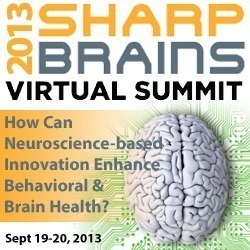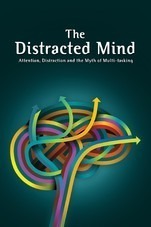Posts Tagged ‘PBS’
Top 30 Highlights from the 2013 SharpBrains Virtual Summit: The latest on Brain Research, Health and Innovation
Over 30 speakers and 170 registered participants discussed the latest on brain research, health and innovation at the fourth annual SharpBrains Virtual Summit, held in September 2013. Here are some of the fascinating highlights* that can help identify emerging opportunities and prepare for significant changes likely to occur in the next 3–5 years. What surprised/ impressed…
Read MoreRaising awareness about the distracted mind (PBS special)
I feel it is critical that scientists make an effort to translate their research discoveries into a format that is understandable and meaningful to the general public. They should also, at least on occasion, step beyond detailed descriptions of laboratory results and speculate on how their findings inform the bigger picture and impact people’s lives.…
Read MoreSteve Jobs: Computers are the Bicycles of the Mind
Fascinating raw footage from a 1990 interview with Steve Jobs. Please don’t miss the profound and quite funny first three minutes and a half (the rest is a more usual tech interview). Watch An Interview With Steve Jobs on PBS. See more from NOVA. Money quote:
Read MoreTranscript: Alvaro Fernandez on Brain Health and Non-invasive Cognitive Enhancement
Below you can find the full transcript of our engaging Q&A session yesterday on lifelong cognitive fitness, “mental capitalism”, and more, with Alvaro Fernandez, co-author of The SharpBrains Guide to Brain Fitness, moderated by Harry Moody, Director of Academic Affairs at AARP.
Read MoreTop 30 Brain Health and Fitness Articles of 2008
Here you have SharpBrains’ 30 most popular articles, ranked by the number of people who have read each article in 2008. Please note that, since the first article already includes most of our most popular brain teasers, we have excluded teasers from the rest of the ranking. (If those 50 are not enough for you, you…
Read MoreTowards a Healthy Living & Cognitive Health Agenda
Here you have the November edition of our monthly newsletter covering cognitive health and brain fitness topics. Please remember that you can subscribe to receive this Newsletter by email, simply by submitting your email at the top of this page. Thank you for your interest, attention and participation in our SharpBrains community. As always, we appreciate…
Read More


